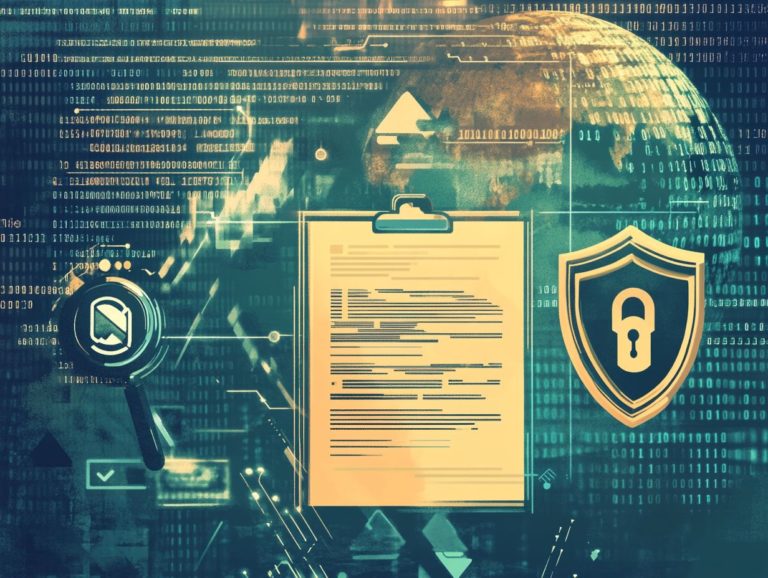understanding the role of compliance officers
In today s fast-paced world of rules and regulations, your role as a compliance officer is crucial. You are the guardian of ethical practices, ensuring that your organization meets legal requirements and maintains industry standards.
From developing policies to conducting audits, you navigate diverse responsibilities that balance organizational goals with these obligations. Let s explore the vital functions of compliance officers!
Dive in to uncover the complexities and significance of this essential role that you play.
Contents
- Key Takeaways:
- The Role of Compliance Officers
- Responsibilities of Compliance Officers
- Developing and Implementing Policies and Procedures
- Conducting Audits and Assessments
- Qualifications and Skills of Compliance Officers
- Challenges Faced by Compliance Officers
- The Future of Compliance Officers
- Frequently Asked Questions
- Wondering what a compliance officer really does?
- What are the main duties of a compliance officer?
- Why is compliance important in business?
- What qualifications or skills are needed to become a compliance officer?
- What are some common challenges faced by compliance officers?
- How can compliance officers ensure their programs are effective?
Key Takeaways:

Compliance officers ensure that organizations follow laws and policies. They create programs, conduct audits, and need specific skills. They face challenges, but new technologies present opportunities.
The Role of Compliance Officers
The role of compliance officers has become critical in today s intricate and quickly evolving regulatory environment, especially in financial services and healthcare.
These professionals are at the forefront, ensuring that organizations meet various compliance programs and regulatory requirements while upholding ethical standards.
By crafting and implementing robust compliance strategies, compliance officers help mitigate risks and preserve organizational integrity.
Their impact goes beyond oversight; they establish and enforce policies that align with the legal regulations governing their industries.
Defining Compliance and its Importance
Compliance means following the rules set by legal bodies. It s essential for a trustworthy business.
When you ensure that your business operates within established legal frameworks, you protect not just your organization s reputation; you also safeguard the interests of various stakeholders, including employees, customers, and investors.
In sectors like financial services, where rules can be strict, following compliance measures is critical in preventing fraud and preserving consumer trust. Similarly, in healthcare, compliance ensures patient safety and privacy while fostering accountability.
As industries evolve, the compliance landscape adapts to tackle new challenges, highlighting the importance of ongoing education and innovative practices in every field.
Responsibilities of Compliance Officers
As a compliance officer, your role is crucial. You ensure that your organization follows rules and maintains high ethical standards across sectors like financial services and healthcare.
Your responsibilities are diverse and vital for navigating the complex compliance landscape, safeguarding both the reputation of your organization and the trust of its stakeholders.
Ensuring Regulatory Compliance
Ensuring regulatory compliance is your primary responsibility. This involves establishing and overseeing compliance programs tailored to your industry.
To tackle compliance challenges, you regularly monitor and audit processes. You also assess risks and ensure policies are working effectively.
The importance of routine evaluations cannot be overstated; they provide valuable insights into the ever-changing regulatory landscape and enable your organization to proactively update its compliance programs.
By taking these steps, you make sure your organization follows rules and is ready for any changes.
Developing and Implementing Policies and Procedures

Developing and implementing robust organizational policies and procedures is critical for you as a compliance officer. This helps you navigate the complex compliance landscape and meet regulatory requirements.
In this pivotal role, you align organizational practices with legal standards. You ensure that all regulatory frameworks are integrated into daily operations.
Establishing effective training programs helps employees understand and follow these policies, fostering a culture of compliance throughout the organization.
Strong internal controls serve as your first line of defense against potential violations. This enables ongoing monitoring and risk assessment.
This proactive approach not only reduces legal risks but also enhances the overall integrity and accountability of the organization.
Conducting Audits and Assessments
Conducting compliance audits and assessments is essential for identifying potential compliance violations and evaluating the effectiveness of your existing measures.
These audits come in various forms internal audits, external audits, and risk assessments. Each plays a distinct role in your organization s risk management framework.
By effectively pinpointing areas of non-compliance, these evaluations help refine your compliance programs. This ensures you meet regulatory requirements and mitigate potential risks.
You may face challenges such as data availability, stakeholder engagement, and keeping up with evolving regulations during the auditing process. Thorough assessments are vital; they help you develop robust strategies to tackle these barriers head-on.
Qualifications and Skills of Compliance Officers
To succeed as a compliance officer, you need the right education, skills, and certifications that enable you to navigate the intricate regulatory landscape and mitigate compliance risks effectively.
Educational Requirements
Educational requirements for compliance officers typically involve obtaining a degree in fields like finance, law, or healthcare administration. Pursuing specialized compliance certifications is essential to enhance your expertise.
In sectors like healthcare, certifications such as:
- Certified in Healthcare Compliance (CHC)
- Certified Compliance and Ethics Professional (CCEP)
are vital for keeping you informed about industry regulations. In financial services, credentials like:
- Certified Anti-Money Laundering Specialist (CAMS)
are critical for developing a comprehensive understanding of regulatory frameworks.
Financial examiners play a crucial role in compliance education by analyzing financial records and ensuring adherence to laws. Their insights help refine your strategies and build robust compliance frameworks within your organization.
Essential Skills and Experience
Essential skills for compliance officers include strong communication abilities, analytical thinking, and a deep understanding of compliance regulations. These skills are vital for effectively managing the compliance landscape.
When you possess these capabilities, navigating compliance challenges becomes much smoother. You can maneuver through complex regulatory frameworks with confidence.
Your effective communication skills enable you to engage stakeholders, ensuring everyone is aligned on compliance expectations. By clearly articulating compliance processes, you foster a culture of adherence within your organization.
These skills are vital in training. When you share information simply, employees grasp compliance better, leading to improved adherence to guidelines and reduced risk of violations.
Challenges Faced by Compliance Officers

As a compliance officer, you face numerous challenges in your role, largely due to the constantly shifting regulatory risk landscape.
Balancing compliance requirements with corporate responsibility demands both agility and strategic foresight.
Navigating complex regulations presents a significant challenge for compliance officers, especially in sectors like healthcare, where regulatory requirements are stringent and multifaceted.
To tackle these challenges effectively, employ a variety of strategies tailored to your environment. Continuous education and training will be your allies, keeping you updated on the ever-evolving landscape of laws and standards.
By leveraging technology think compliance management software you can track and interpret regulations with greater ease. Fostering open communication across departments is key; it aligns all team members with compliance goals and enables you to implement proactive measures.
Establishing robust compliance programs that incorporate regular audits and risk assessments significantly mitigates potential violations and bolsters operational integrity. This proactive approach keeps you compliant and boosts your organization’s reputation.
Balancing Compliance with Business Objectives
Balancing compliance with your business objectives is a critical undertaking for you as a compliance officer. You need to ensure that your organizational goals align seamlessly with regulatory compliance and ethical standards.
This intricate dance protects your organization from potential legal pitfalls and promotes honesty and openness.
Take Patagonia, for instance; they have woven environmental compliance into their business model, proving that sustainability can drive profit and compliance.
Similarly, financial institutions implement strong compliance measures to monitor trading practices, reinforcing their aim of maintaining investor confidence.
By strategically aligning your compliance efforts with your business plans, you can forge a relationship that enhances both regulatory adherence and overall performance.
The Future of Compliance Officers
Get ready! The future of compliance officers is about to change dramatically as emerging technologies and evolving regulatory requirements redefine the landscape across various industries.
You can expect a dynamic shift in how compliance is approached, necessitating adaptability and a keen understanding of these changes to navigate this new terrain.
Emerging Technologies and Trends
Emerging technologies are transforming how you manage compliance programs and ensure data protection while dealing with complicated rules.
With the integration of compliance software, you can streamline workflows, automate routine tasks, and maintain a centralized repository of essential documents.
Artificial intelligence is becoming a critical ally, helping predict issues before they occur and enhancing your risk assessment processes.
Data analytics tools provide insights into operational efficiencies, enabling you to shift your focus from reactive measures to strategic initiatives.
As remote work becomes the norm, trends like increased emphasis on cybersecurity and a growing demand for transparency in data handling are reshaping the landscape for compliance professionals. Adapt now and embrace these innovative solutions!
Frequently Asked Questions

Wondering what a compliance officer really does?
A compliance officer is responsible for ensuring that a company or organization follows all relevant laws, regulations, and internal policies. This includes monitoring and reporting on compliance issues, developing compliance programs, and providing training to employees.
What are the main duties of a compliance officer?
- Conducting risk assessments
- Implementing compliance policies and procedures
- Investigating potential violations
- Reporting findings to senior management or regulatory bodies
Why is compliance important in business?
Compliance is crucial for businesses because it ensures they operate ethically and in accordance with applicable laws and regulations. It also helps mitigate risks and protect the company’s reputation.
What qualifications or skills are needed to become a compliance officer?
To become a compliance officer, you typically need a background in law, finance, or business. Strong analytical skills and effective communication are also essential.
What are some common challenges faced by compliance officers?
Compliance officers often struggle to keep up with changing regulations. They also need to balance multiple priorities while explaining compliance rules to everyone in the organization.
How can compliance officers ensure their programs are effective?
Compliance officers can make their programs work better by regularly updating policies. Providing ongoing training and conducting internal audits are also vital steps.






